2020年小升初英语总复习 考点专项训练:一般将来时 2
小学英语小升初《一般将来时》练习题(附参考答案)
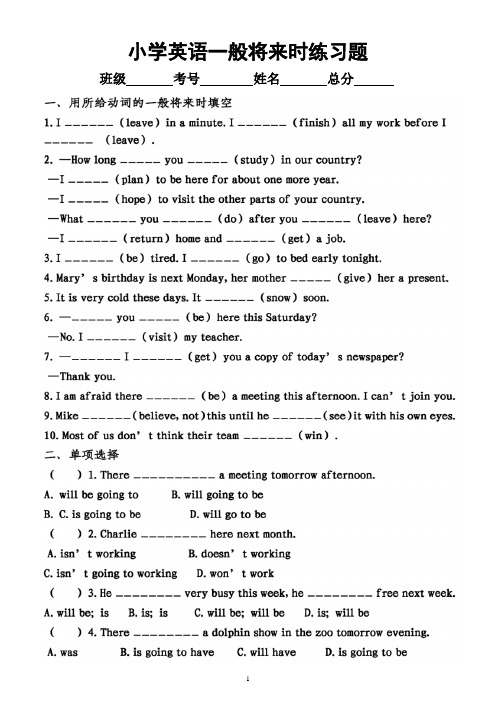
小学英语一般将来时练习题班级考号姓名总分附:参考答案一、用所给动词的一般将来时填空1. I (leave)in a minute. I (finish)all my work before I (leave).2. —How long will you (study)in our country?—I (plan)to be here for about one more year.—I (hope)to visit the other parts of your country.—What you (will do)after you (leave)here?—I (will return)home and (get)a job.3. I (am)tired. I (will go)to bed early tonight.4. Mary’s birthday is next Monday, her mother(will give)her a present.5. It is very cold these days. It (will snow)soon.6. —Will you(be)here this Saturday?—No. I (will visit)my teacher.7. —Shall I (get)you a copy of today’s newspaper?—Thank you.8. I am afraid there (will be)a meeting this afternoon. I can’t join you.9. Mike (won’t believe)this until he (sees)it with his own eyes.10. Most of us don’t think their team (will win).二、单项选择(C)1. There ____ a meeting tomorrow afternoon.A. will be going toB. will going to beC. is going to beD. will go to be(D)2. Charlie __ here next month.A. isn’t workingB. doesn’t workingC. isn’t going to workingD. won’t work(D)3. He __ very busy this week, he __ free next week.A. will be; isB. is; isC. will be; will beD. is; will be(D)4. There __ a dolphin show in the zoo tomorrow evening.A. wasB. is going to haveC. will haveD. is going to be(D)5. –__ you __ free tomorrow?– No. I __ free the day after tomorrow.A. Are; going to; willB. Are; going to be; willC. Are; going to; will beD. Are; going to be; will be(B)6. Mother __ me a nice present on my next birthday.A. will givesB. will giveC. givesD. give(C)7. – Shall I buy a cup of tea for you?–__. (不,不要。
(通用版)2020小升初英语专项复习梳理(三)时态试题

2020小升初英语专项复习梳理(三)时态一、现在进行时现在进行时表示现在正在进行或发生的动作。
(一)结构:be(am, is , are)动词+现在分词(动词的ing形式)(二)常用的时间状语有:now, look, listen等。
I’m playing basketball now. 我现在正在打篮球。
Look! The girl is dancing. 看,那个女孩正在跳舞。
Listen! The bird is singing. 听,小鸟正在唱歌。
(三)各种句式1. 肯定句:主语+be动词+现在分词+其他。
The boy is doing his homework. 那个男孩正在做作业。
2.否定句:主语+be动词+not+现在分词+其他。
The boy isn’t doing his homework.那个男孩没有做作业。
3.一般疑问句:Be动词+主语+现在分词+其他?─Is the boy doing his homework? 那个男孩正在做作业吗?─Yes, he is. / No, he isn’t. 是的,他在。
/ 不,他没有。
二、一般现在时一般现在时表示经常反复发生的动作、存在的状态或习惯性的动作的时态。
常用的时间状语有:often, sometimes, usually, in the morning/afternoon/evening, every week/day/year 等。
(一)构成1.表示目前的状态,谓语动词用be动词。
⑴肯定句:主语+be动词+其他 The girls are in the playground. 女孩子们在操场上。
⑵否定句:主语+be动词+not+其他The girls aren’t in the playground.女孩们不在操上。
⑶一般疑问句:Be动词+主语+其他?Are the girls in the playground?女孩们在操场上吗?⑷特殊疑问句:特殊疑问词+be动词+其他?Where are the girls? 女孩们在哪里?2.表示经常发生的习惯性动作⑴当主语不是第三人称单数时:①肯定句:主语+动词原形+其他I clean the room every day.②否定句:主语+助动词(don’t)+动词原形+其他。
小升初英语时态专项复习及答案
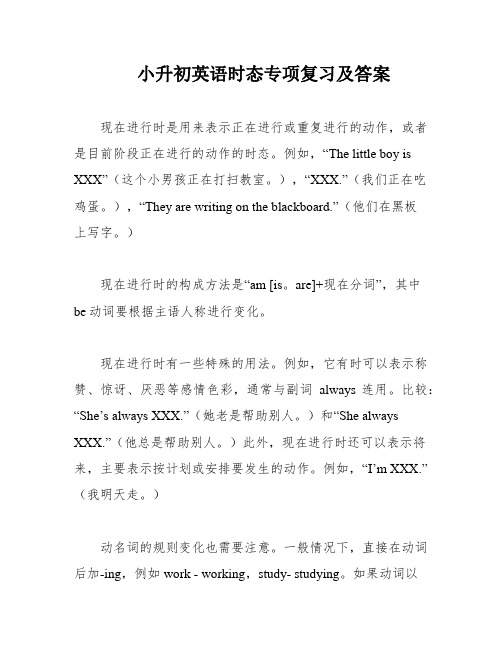
小升初英语时态专项复习及答案现在进行时是用来表示正在进行或重复进行的动作,或者是目前阶段正在进行的动作的时态。
例如,“The little boy is XXX”(这个小男孩正在打扫教室。
),“XXX.”(我们正在吃鸡蛋。
),“They are writing on the blackboard.”(他们在黑板上写字。
)现在进行时的构成方法是“am [is。
are]+现在分词”,其中be动词要根据主语人称进行变化。
现在进行时有一些特殊的用法。
例如,它有时可以表示称赞、惊讶、厌恶等感情色彩,通常与副词always连用。
比较:“She’s always XXX.”(她老是帮助别人。
)和“She always XXX.”(他总是帮助别人。
)此外,现在进行时还可以表示将来,主要表示按计划或安排要发生的动作。
例如,“I’m XXX.”(我明天走。
)动名词的规则变化也需要注意。
一般情况下,直接在动词后加-ing,例如work - working,study- studying。
如果动词以不发音的-e结尾,要去-e加-ing,例如take- taking,make-making。
对于重读闭音节的动词,若末尾只有一个辅音字母,要双写辅音字母,再加-ing,例如cut - cutting,put -putting。
以-ie结尾的动词要把变成y再加-ing,例如lie-lying,die - dying。
现在进行时的真题再现包括“Look!XXX XXX.”(瞧,孩子们正在踢足球。
)和“Look。
XXX XXX down from the tree.”(瞧,小熊猫正在从树上下来。
)1.XXX is XXX.2.I am watching TV right now.3.She is working in a hospital.4.Kitty and Ben are having XXX XXX.5.His father is able to help them.6."Danny。
2020年小升初英语总复习第4章—动词和时态4:一般将来时

Monday? —Yes, they are. /No, they aren’t.
(4) 特殊疑问句:特殊疑问词+be+主语+going to+动词原形(+其他)?
2. 单项填空。
row.
A. do
B. is going
C. is going to
( B )(2)Sarah and Tom ____ the bookstore tonight.
A. are going B. are going to C. is going to
如:I’m going to visit the Great Wall with my
parents. → What are you going to do? 【注】be going to 结构中的be动词要随人称的变
化而变化,该结构一般用于表示主语主观上计划或安 排将要去做的事情。
2. will结构 (1)肯定句:主语+will+动词原形+其他. 如:I will play the ball tomorrow.
( A )(3)My mother ____ shopping next weekend.
A. is going to go B. is going C. has going to
( C )(4)Tomorrow is January 1st,we ____ a holiday.
A. have
B. is having
答案:1. Sarah is going to/will clean her room this
2020小升初英语总复习时态

☆时态☆小学阶段一共学了四种时态,分别是:一般现在时,一般将来时,现在进行时,一般过去时。
下面我们一一进行总结。
1、一般现在时A、表示不受时限的客观存在如:He is a boy. She is a student. My mother is a nurse.This is a dog. I have a story-book.B、表示现在的习惯动作,即指现在经常发生的动作,一般现在时常用来表示现在时间里某种动作的经常性和习惯性。
它常与表示程度或频度的词连用,如:often(经常), usually(通常,一般), sometimes (有时), always(总是,一直), never(从不)如:I often go to school on foot. My father works in a school.Mike watches TV every day.I usually play computer games on the weekend.C、表示现时的状态和现在瞬间动作如:How are you? You look happy.What’s the matter with you? I have a headache.What do you have for lunch? I have some chicken.☆注意☆英语动词的现在时与原形同形。
但当主语是第三人称单数时,须在词尾加-s 或 -es。
例如:I have a fish for dinner. Her mother works in a hospital.Amy often goes to school by bike. Mr. Liu teaches us English.加-es 的动词必须是以“sh , ch , o ”等字母结尾的。
如:watches , teaches , goes , washes2、现在进行时表示说话时正在进行的动作或现阶段一直在进行的动作。
2020年六年级下册英语试题-小升初英语专项练习 一般将来时 填空题(含答案及解析)
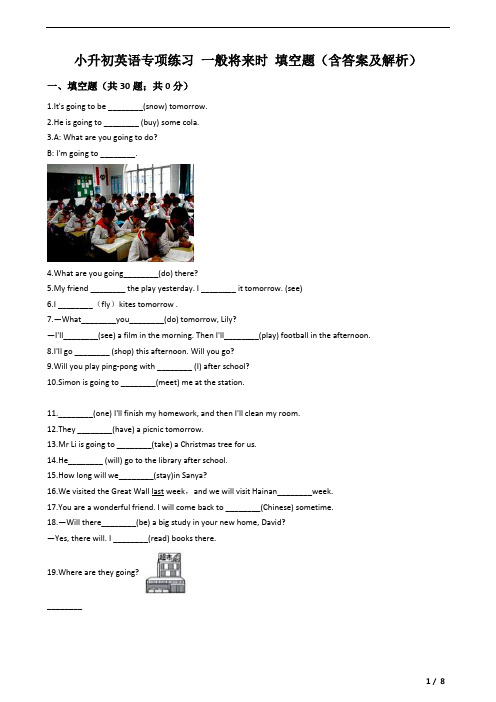
小升初英语专项练习一般将来时填空题(含答案及解析)一、填空题(共30题;共0分)1.It's going to be ________(snow) tomorrow.2.He is going to ________ (buy) some cola.3.A: What are you going to do?B: I'm going to ________.4.What are you going________(do) there?5.My friend ________ the play yesterday. I ________ it tomorrow. (see)6.I ________(fly)kites tomorrow .7.—What________you________(do) tomorrow, Lily?—I'll________(see) a film in the morning. Then I'll________(play) football in the afternoon.8.I'll go ________ (shop) this afternoon. Will you go?9.Will you play ping-pong with ________ (I) after school?10.Simon is going to ________(meet) me at the station.11.________(one) I'll finish my homework, and then I'll clean my room.12.They ________(have) a picnic tomorrow.13.Mr Li is going to ________(take) a Christmas tree for us.14.He________ (will) go to the library after school.15.How long will we________(stay)in Sanya?16.We visited the Great Wall last week,and we will visit Hainan________week.17.You are a wonderful friend. I will come back to ________(Chinese) sometime.18.—Will there________(be) a big study in your new home, David?—Yes, there will. I ________(read) books there.19.Where are they going?________20.She is going to take photos.21.Mon.It will________on Monday. Lingling is going to ________.22.Sat.It will________ ________ on Saturday. I'm going to________.23.Tue.It will________ ________ on Tuesday. I'm going to________.24.A: Are you going to get a haircut?B: No, I'm going to ________.25.Sam will ________ (become)a teacher in the future.26.________(be) there many trees in this forest in the past?—Yes, there________(be). But now there________(be) not many trees. —________people________(plant) more trees in the future?—I don't know.27.They ________(plant) trees tomorrow.28.We ________(visit) the farm next week.29.We're going to ________(have) a picnic in the park.30.When are you going to ________(play) chess?答案部分第 1 题:【答案】snowy【考点】形容词,一般将来时【解析】【分析】句意:明天将下雪。
小升初英语语法专题精讲学案 一般将来时(含答案)
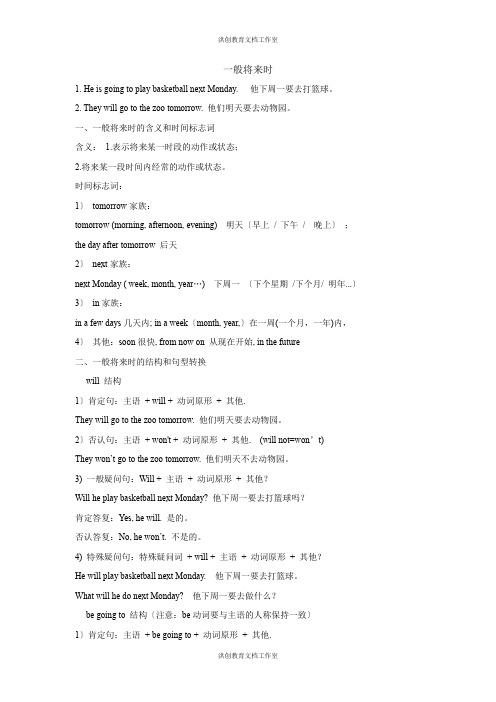
一般将来时1. He is going to play basketball next Monday. 他下周一要去打篮球。
2. They will go to the zoo tomorrow. 他们明天要去动物园。
一、一般将来时的含义和时间标志词含义:1.表示将来某一时段的动作或状态;2.将来某一段时间内经常的动作或状态。
时间标志词:1〕tomorrow家族:tomorrow (morning, afternoon, evening) 明天〔早上/ 下午/ 晚上〕;the day after tomorrow 后天2〕next家族:next Monday ( week, month, year…) 下周一〔下个星期/下个月/ 明年...〕3〕in家族:in a few days几天内; in a week〔month, year,〕在一周(一个月,一年)内,4〕其他:soon很快, from now on 从现在开始, in the future二、一般将来时的结构和句型转换will 结构1〕肯定句:主语+ will + 动词原形+ 其他.They will go to the zoo tomorrow. 他们明天要去动物园。
2〕否认句:主语+ won't + 动词原形+ 其他. (will not=won’t)They won’t go to the zoo tomorrow. 他们明天不去动物园。
3) 一般疑问句:Will + 主语+ 动词原形+ 其他?Will he play basketball next Monday? 他下周一要去打篮球吗?肯定答复:Yes, he will. 是的。
否认答复:No, he won’t. 不是的。
4) 特殊疑问句:特殊疑问词+ will + 主语+ 动词原形+ 其他?He will play basketball next Monday. 他下周一要去打篮球。
小升初英语一般将来时专项训练含答案
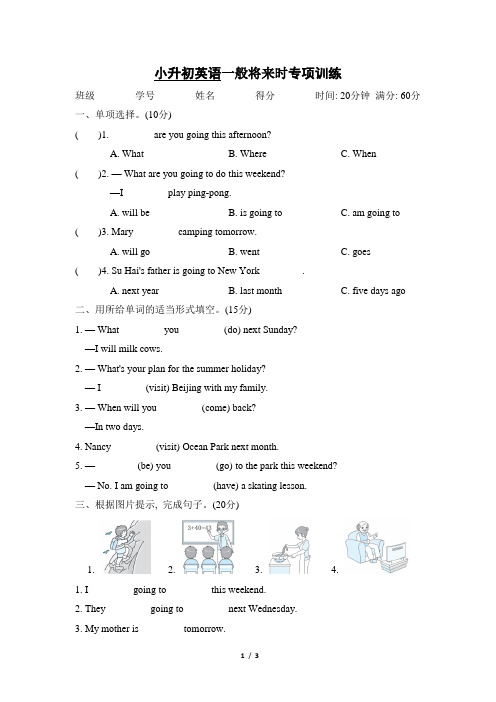
小升初英语一般将来时专项训练班级_______ 学号_______ 姓名_______ 得分_______ 时间: 20分钟满分: 60分一、单项选择。
(10分)( )1. ________ are you going this afternoon?A. WhatB. WhereC. When( )2. — What are you going to do this weekend?—I ________ play ping-pong.A. will beB. is going toC. am going to ( )3. Mary ________ camping tomorrow.A. will goB. wentC. goes( )4. Su Hai's father is going to New York ________.A. next yearB. last monthC. five days ago二、用所给单词的适当形式填空。
(15分)1. — What ________ you ________ (do) next Sunday?—I will milk cows.2. — What's your plan for the summer holiday?— I ________ (visit) Beijing with my family.3. — When will you ________ (come) back?—In two days.4. Nancy ________ (visit) Ocean Park next month.5. —________ (be) you ________ (go) to the park this weekend?— No. I am going to ________ (have) a skating lesson.三、根据图片提示, 完成句子。
2020年小升初六年级英语语法专项考点精讲+典题突破专题03《一般将来时》(通用版含答案)

2020年⼩升初六年级英语语法专项考点精讲+典题突破专题03《⼀般将来时》(通⽤版含答案)⼩升初英语语法专项透析专题03《⼀般将来时》【考点精讲】⼀般将来时⼀.意义:表⽰将来某个时间要发⽣的动作或存在的状态,也表⽰将来经常或重复发⽣的动作。
⼆. 构成及变化:⼀般将来时常⽤的两种结构be going to+动词原形 : 表⽰打算、准备做的事或即将发⽣或肯定要发⽣的事。
shall/will+动词原形 : 表⽰将要发⽣的动作或情况,没有太多的计划性, 还⽤来表⽰意愿1. be going to +动词原形1.肯定句主语+be(am /,is,/ are) going to +动词原形+其它成份My sister is going to learn English next year. 我姐姐准备明年学英语。
2.否定句主语+be(am / is / are)not going to +动词原形 +其它成份I am not going to(go to)the cinema tonight. 我今天晚上不打算去看电影。
3.⼀般疑问句Be (am / is / are)+主语+going to+动词原型+其它成份…?Is your father going to play basketball with you ?No , he isn’t.你⽗亲打算和你去打篮球吗?不。
4.特殊疑问句特殊疑问词(Wh-)+⼀般疑问句 ?Where are you going to spend Spring Fesital.? 春节你打算在哪过?5.注意: be going to 结构后⾯习惯上不跟 go , come 等表位移的动词,⼀般⽤该动词的进⾏时形式表⽰。
如: He’s going to New York next week.下周他要去纽约.2.will /shall +动词原形(在书⾯语中,主语是第⼀⼈称时,常⽤shall ,在⼝语中,所有⼈称都可以⽤will)1.肯定句主语+will/shall+动词原形+其它成份I (shall) write to him next week. 下周我将给他写信。
2020年小升初英语热点题型一04时态
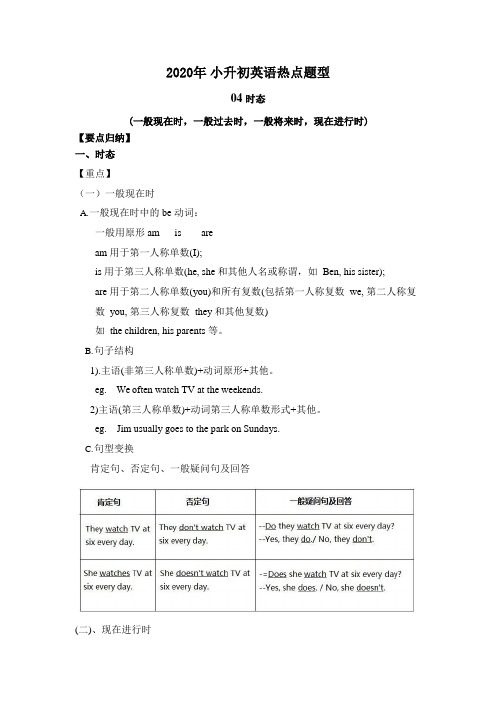
2020年小升初英语热点题型04 时态(一般现在时,一般过去时,一般将来时,现在进行时)【要点归纳】一、时态【重点】(一)一般现在时A.一般现在时中的be 动词:一般用原形am is aream 用于第一人称单数(I);is 用于第三人称单数(he, she 和其他人名或称谓,如Ben, his sister);are 用于第二人称单数(you)和所有复数(包括第一人称复数we, 第二人称复数you, 第三人称复数they 和其他复数)如the children, his parents 等。
B.句子结构1).主语(非第三人称单数)+动词原形+其他。
eg. We often watch TV at the weekends.2)主语(第三人称单数)+动词第三人称单数形式+其他。
eg. Jim usually goes to the park on Sundays.C.句型变换肯定句、否定句、一般疑问句及回答(二)、现在进行时A.构成形式:主语+be 动词+动词的ing 形式+其他。
这里强调一点,两者缺少其中任何一种都不可以构成现在进行时。
B.现在进行时表示动作正在进行或事情正在发生。
C.句型变换:(三)、一般过去时A.一般过去时中的be 动词一般用过去式: was werewas 用于第一人称单数(I)和第三人称单数(he, she 和其他人名或称谓,如Ben, his sister 等)were 用于第二人称单数(you)和所有复数(包括第一人称复数we, 第二人称复数you,第三人称复数they 和其他复数,如the children, his parents 等)。
B.构成形式:主语+动词的过去式+其他。
注意:没有be 动词的否定句和疑问句中,用didn’t 否定和用did 提问后,动词在定要用原形。
C.判断依据:(1) be 动词是was, were. (2) 动词加ed; (3)有表示过去的时间状语中,现在学过的常用的表示过去的时间状语有: just now, a moment, yesterday, last week, last night, last weekend, last year, last month, three years ago, two weeks ago, five years ago, the day before yesterday.E. 句型变换:(四).一般将来时A.构成形式:(1)主语+be going to+动词原形+其他。
小升初英语一般将来时考点与例题

小升初英语一般将来时考点与例题小升初英语一般将来时考点与例题小升初英语是小升初考试的重点课程,以下是店铺搜索整理的.关于小升初英语一般将来时考点与例题,供参考学习,希望对大家有所帮助!想了解更多相关信息请持续关注我们店铺!一般将来时:主要描述将来要发生的事情。
句末常出现next Monday/week/ year, tomorrow组成:主语+be going to +动词原形I am going to visit Ann.They are going to draw a dog.She is going to ride a horse.否定句:在be后加notI am not going to visit Ann.They are not going to draw a dog.She is going to ride a horse.疑问句:将be提前—Are you going to visit Ann?—Yes, I am. / No, I am not.—Are they going to draw a dog?—Yes, they are./ No, they aren’t.—Is she going to ride a horse?—Yes, she is. / No, she isn’t.组成:主语+will+动词原形I will go to the library.They will clean the house.She will eat breakfast at home.否定句:在will 后加not 或将will not 写为won’tI will not go to the library.They will not clean the house.She will mot eat breakfast at home.疑问句:将will 提前—Will you go to the library?—Yes, I will./ No, I won’t.—Will they clean the house?—Yes, they will. / No, they won’t.—Will she eat breakfast at home?—Yes, she will. /No, she won’t.一般将来时练一练:A、根据中文,完成句子,每空一词。
小升初英语一般将来时阅读理解专项练习题(含答案解析)

1、阅读短文,判断正(T)误(F)。
Amy:Where are you going this summer holiday? John:I’m going to Guilin. Amy:Oh, I went there with my mom last summer holiday. 、 John:Really? How did you get there? Amy:I went to Guilin by train. It was crowded on the train. John:I’m going there by plane. Amy;Good idea. Who are you going with? John:I’m going with my parents. Amy:Guilin is very beautiful. We were very happy on our trip. You will have a good time. John: Thank you.
⑴John is going to Guilin with his father and mother this summer holiday. ⑵Amy went there with her parents last year. ⑶It was not comfortable to go there by train. ⑷John is going there by plane. ⑸Guilin is in north of China.
• ⑷还是由句子John: I’m going therห้องสมุดไป่ตู้ by plane.“John:我打算坐飞机去那。”
小升初英语语法练习题:一般将来时

这篇关于《⼩升初英语语法练习题:⼀般将来时》,是特地为⼤家整理的,希望对⼤家有所帮助!⼀般将来时专项练习⼀.填空My brother ______ (go) to Shanghai next week.Mary ________ (see) her grandfather tomorrow.David ________ (fly) kites in the park this weekend.I_______ (make) a plan for English study in three days.Who _______ (be) going to learn a new song next Tuesday?_______ (be) you going to Beijing tomorrow?We _______ (not be) going to have lunch at 12:00 tomorrow.8. Where _______ you _______ (leave) for tomorrow?9._______ Tom _______ (have) a P.E. lesson next Monday?10. What _______ they _______ (watch) in thegym tomorrow?11.what _____ they _______( do ) tomorrow ?12.The boy _______( not have ) an English lesson tomorrow .13.________ you _______( learn ) Chinese next week ?14.I ________ ( arrive ) there tomorrow .15.Mike _________ ( not watch ) a movie tomorrow .⼆.选择填空1. ( ) She is going to ________ after school.A. listening to musicB. listens to musicC. listen to musicD. listened to music2. ( ) We _______ in Beijing in two days.A. will arrivesB. arrivesC. are going to arriveD. arriving3. ( )The students ________ dumplings tomorrow.A. is going to makeingB. are makingC. will makeD. are make4. ( ) Are you going to_________ thirteen years old next year?A. will beB. areC. beD. go5. ( ) ___will see a play in 5 days?A. WhenB. WhatC. WhoD. Whose6. ( ) Mary______ English next year.A. will learnB. will to learnC. are going to learn.D. learns7. ( ) He’ll _____ shopping this afternoon.A. goingB. goC. goesD. went8. ( ) Will you ____ at the bus stop at 10:30?A. meetingB. meetsC. meetD. met9. ( ) Lily and I _______ the guitar. next week.A. am going to playB. are going to playC. will playsD. play10. ( ) How ______ Jenny ___ home tomorrow?A. does......goB. is……goingC. will……goD. do……go11. ( ) Who is going to _________ a song ?A. sings B singing C. to sing D. sing12. ( ) I _________in Beijing in three days.A. are going to arriveB. arriveC. will arriveD. arrives13. ( ) He _______some model planes tomorrow .A. going to makeB. is makingC. will make D makes14. ( ) Are you going to ___________a doctor next year ?A. will beB.. areC. beD. are going to15. ( ) She ________ you make supper this evening .A. helpsB. will helpC. is helpingD. is going help三.把下列句⼦变成⼀般疑问句,并给出肯定和否定回答。
2020年六年级下册英语试题-小升初英语专项练习 一般将来时 填空题(含答案及解析)

小升初英语专项练习一般将来时填空题(含答案及解析)一、填空题(共30题;共0分)1.It's going to be ________(snow) tomorrow.2.He is going to ________ (buy) some cola.3.A: What are you going to do?B: I'm going to ________.4.What are you going________(do) there?5.My friend ________ the play yesterday. I ________ it tomorrow. (see)6.I ________(fly)kites tomorrow .7.—What________you________(do) tomorrow, Lily?—I'll________(see) a film in the morning. Then I'll________(play) football in the afternoon.8.I'll go ________ (shop) this afternoon. Will you go?9.Will you play ping-pong with ________ (I) after school?10.Simon is going to ________(meet) me at the station.11.________(one) I'll finish my homework, and then I'll clean my room.12.They ________(have) a picnic tomorrow.13.Mr Li is going to ________(take) a Christmas tree for us.14.He________ (will) go to the library after school.15.How long will we________(stay)in Sanya?16.We visited the Great Wall last week,and we will visit Hainan________week.17.You are a wonderful friend. I will come back to ________(Chinese) sometime.18.—Will there________(be) a big study in your new home, David?—Yes, there will. I ________(read) books there.19.Where are they going?________20.She is going to take photos.21.Mon.It will________on Monday. Lingling is going to ________.22.Sat.It will________ ________ on Saturday. I'm going to________.23.Tue.It will________ ________ on Tuesday. I'm going to________.24.A: Are you going to get a haircut?B: No, I'm going to ________.25.Sam will ________ (become)a teacher in the future.26.________(be) there many trees in this forest in the past?—Yes, there________(be). But now there________(be) not many trees. —________people________(plant) more trees in the future?—I don't know.27.They ________(plant) trees tomorrow.28.We ________(visit) the farm next week.29.We're going to ________(have) a picnic in the park.30.When are you going to ________(play) chess?答案部分第 1 题:【答案】snowy【考点】形容词,一般将来时【解析】【分析】句意:明天将下雪。
英语中一般将来时的总结与练习题

英语中一般将来时的总结与练习题一、一般将来时的总结1. 一般将来时的定义一般将来时表示将来某个时间要发生的动作或存在的状态,也常用于表示将来一段时间内的经常性动作或状态。
在英语中,一般将来时主要由助动词“will”或“shall”(第一人称)加动词原形构成。
此外,“be going to + 动词原形”也可表示将来时,常用于根据目前已知的情况预测未来即将发生的动作或状态。
2. 一般将来时的常见形式•“will + 动词原形”•“shall + 动词原形”(第一人称)•“be going to + 动词原形”•“be to do”结构(表示按计划或安排即将发生的动作)•“be about to + 动词原形”(表示即将发生的动作,不能与表示将来的时间状语连用)3. 一般将来时的用法•表示将来的动作或状态,通常与表示将来的时间状语连用,如“tomorrow”, “next year”, “in the future”等。
•表示根据现有情况推测未来可能发生的动作或状态,常用于“be going to”结构中。
•表示计划、安排或打算做的事情,常与“be to do”结构连用。
4. 与其他时态的区别•与现在进行时区别:现在进行时表示正在进行的动作,而一般将来时表示将来某个时间要发生的动作。
•与现在完成时区别:现在完成时表示过去发生的动作对现在造成的影响或结果,而一般将来时则表示未来即将发生的动作。
二、一般将来时的练习题1. 选择题(1) —_____ you _____ a party next weekend?—Yes, we will.A. Will; haveB. Are; havingC. Do; haveD. Are; go to have(2) They _____ a meeting this afternoon.A. are havingB. are going to haveC. will havingD. will have(3) —_____ you _____ your homework before you watch TV?—Yes, I _____.A. Will; do; willB. Are; doing; amC. Are; going to do; amD. Will; do; am2. 填空题(1) I _____ (meet) my friend at the airport tomorrow.(2) They _____ (not go) to the zoo if it rains.(3) We _____ (have) a picnic next Sunday. Will you join us?3. 翻译题(1) 明天我要去看望我的祖父母。
(小升初)英语语法复习课件-一般将来时全梳理+同步练习+通用版

2.一般将来时的标志词
接着让我们来看看这几个句子^^
-I will be the head teacher in the future. -我将来会成为校长。
-I will go to school tomorrow. 我明天要去学校。
-He will go shopping this afternoon. -他今天下午要去逛街。
让我们来看两个句子^^
-I will play football tomorrow. -我明天将要踢足球。
-I will be 13 years old next year. -我明年就要13岁了。
在用法上,我们用will+动词原形表示将要发生的动作; 用will+be+名词/形容词形成系表结构,表示主语将来 的身份,或所处的状态。当然还可以用will+be+介词 短语。让我们接下一页看几个例句吧!
lesson next Tuesday afternoon. 3. It will be fine there next Monday. It _w__o_n_’_t _ be
will be+名词/形容词/介词短语
-I will be 13 years old next year.
-我明年就要13岁了。 加名词
-Schools will be different.
-学校会变得不同。
加形容词
-Schools will be under the sea, on high mountains and
牛刀小试
1. She_______ buy some books tomorrow. ( C )
A.want to B.is going C.will
小升初英语一般将来时专项训练

特殊疑问句
一般将来时的特殊疑问句是将疑问词放在句首,后接 一般疑问句. (就主语提问时,以疑问词 who 开头的疑问句除外.)
疑问词
What Why
一般疑问句
will they do in Ningbo? will he come here?
---- Why will you be here on Sunday? ---- I’ll have a meeting on Sunday.
carry carried
规则动词词-ed的读音
清念 /t/ ,元浊/d/ ;
说明:
/t/ /d/ 之后念/id/
1、清念 /t/ ,即 ed 在清辅音后面念 /t/ ,例:finished helped
passed cooked 2、元浊 /d/ , 即 ed 在元音,浊辅音后面念 /d/ ,
例:borrowed enjoyed
(二). shall/will+动词原形
1.will可用于所有人称,但shall 仅表示单纯将来时, 用于第一人称I和we,作为will的一种替代形式。
2. will , shall可用来预言将来发生的事。如说出我们设 想会发生的事,或者请对方预言将要发生什么事。例如:
It will rain tomorrow. 明天将要下雨。
对特殊疑问句要进行具体回答。
一般将来时的主要用法:
1、表示将来某一时刻的动作或状态: We shall(will) come to see you the day after tomorrow. There will be a wonderful show next week.
2、表示将来某一段时间内经常的动作或状态: The students will come and work in the lab once a week. we shall come and work in this factory every year.
小升初英语(全国通用)复习 一般将来时2

this evening tonight
tomorrow
next week
next weekend next holiday
next month
next year
…
否定形式:把be动词或will后面加not 例如:Jim is not going to play football.
Jim will not play football. 一般疑问句:把be动词或will调到句首 例如:Is Jim going to play football?
一般将来时(the future tense)
一般将来时表示将要发生的事或打算、计划、决定要做
的事情。常与表示将来的时间状语连用。
标志性词:tomorrow, next, soon,tonight, next , week/ weekend/ month/ year, this morning/ afternoon/ evening...
Yes, I am. / No, I’m not. Yes, I will. / No, I won’t.
❖ 一般将来时的句式变化 ❖ 特殊疑问句: ❖ I am going to play football tomorrow. ❖ I will play football tomorrow. ❖ When are you going to play football? ❖ When will you play football?
一.定义
Presentation
表示将来某个时间要发生的动作或存在的状态 。
最基本的结构:will +动词原形
肯定句:主语+ will +动词原形+(宾语)+其他.
否定句:主语+ will not (won't) +动词原形+(宾语)+其他.
- 1、下载文档前请自行甄别文档内容的完整性,平台不提供额外的编辑、内容补充、找答案等附加服务。
- 2、"仅部分预览"的文档,不可在线预览部分如存在完整性等问题,可反馈申请退款(可完整预览的文档不适用该条件!)。
- 3、如文档侵犯您的权益,请联系客服反馈,我们会尽快为您处理(人工客服工作时间:9:00-18:30)。
一般将来时专项训练(二)
一、用括号中所给单词的适当形式填空。
1. I ________ (do) my homework tonight.
2. We ________ (water) the flowers this afternoon.
3. He ________ (buy) a CD next Saturday.
4. You ________ (read) books on the weekend.
5. They ________ (go) the cinema this evening.
6. My parents ________ (fly) to Beijing tomorrow.
7. Mike ________ (watch) TV this evening.
8. Amy ________ (have) a busy weekend tomorrow.
9. Lily ________ (read) books on Saturday morning.
10. Tom and Jack ________ (watch) TV on Saturday afternoon.
11. She ________ (go) shopping on Sunday morning.
12. He ________ (play) football this afternoon.
13. I ________ (go) hiking this afternoon.
二、根据答句写问句。
1. _________________________________________?
I am going to visit my grandparents this weekend.
2. _________________________________________?
He is going at 9:25.
3. _________________________________________?
They are going to the library tomorrow.
4. _________________________________________?
We are going to Shanghai by plane.
5. _________________________________________?
Mike is going to watch TV this evening.
6. _________________________________________?
Liu Yun is going to read books this Saturday.
7. _________________________________________?
John is going to the theme park this weekend.
8. _________________________________________?
Sarah is going to be an English teacher one day.
三、选词填空。
are will visits Great Chinese happy snowy summer is buy busy winter
The ________ holiday is coming. Miss White ________ going to be ________. she is going to ________ a lot of books. She is going to learn Chinese. After that, she ________ go to Beijing. She is going to ________ the ________ Wall there. Then she is going to Harbin. It’s ________ there. She will play with snow. She will be ________.。
